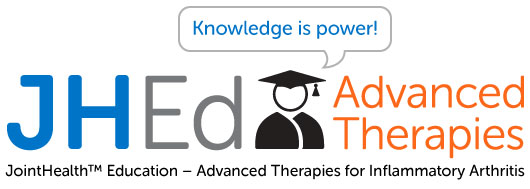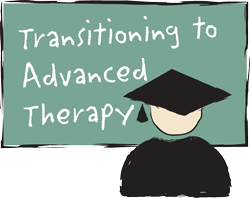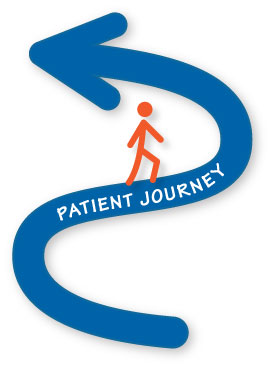In this issue
- Advanced Therapies for Inflammatory Arthritis
- Conventional and advanced therapies for inflammatory arthritis
- The importance of understanding therapy choices
- The rheumatologist perspective
- What you’ll learn
- Thoughts from a JHEd graduate
- JointHealth™ Medications Guide
- JointHealth™ Arthritis Medications Report Card
JointHealth™ insight Published June 2018

In May 2018, Arthritis Consumer Experts (ACE) launched a new JointHealth™Education course titled: Advanced Therapies for Inflammatory Arthritis. JointHealth™ Education: Advanced Therapies for Inflammatory Arthritis is an interactive and evidence based three-lesson course that is designed to help patients living with inflammatory arthritis identify when the time is right to transition from csDMARDs to an advanced therapy, what key questions to ask about how they are taken and about their benefits and risks. The course also gives patients a comprehensive look at factors to consider when making an advanced therapy choice.
In 2016, ACE launched JointHealth™ Education – North Americas first online classroom designed to educate and empower todays modern arthritis patient. JointHealth™ Education equips patients with the information, skills and confidence to be equal partners on their healthcare team.
The first course in the program was JointHealth™Education: Rheumatoid Arthritis (RA) to help patients and their healthcare providers better understand each other’s motivations and goals for the patients overall treatment and care plan. The 6-lesson course was designed based on the views of more than 4,000 RA patients around the world, to ensure that the content was meaningful and relevant to the diverse RA patient community. If you or someone you know has rheumatoid arthritis and have not yet completed JointHealth™ Education: Rheumatoid Arthritis we encourage you to do so, regardless of whether you are newly diagnosed or have been living with the disease for some time. Since 2016, JointHealth™ Education has graduated over a thousand modern arthritis patients and equipped them with the skills necessary to succeed as equal partners in their own care.
regardless of whether you are newly diagnosed or have been living with the disease for some time. Since 2016, JointHealth™ Education has graduated over a thousand modern arthritis patients and equipped them with the skills necessary to succeed as equal partners in their own care.
Conventional and advanced therapies for inflammatory arthritis
Rheumatologists, like all healthcare providers, aim to have their patients regain optimal health as quickly as possible. For patients with inflammatory forms of arthritis (IA), such as rheumatoid arthritis, ankylosing spondylitis or psoriatic arthritis, optimal health is reached by finding a treatment that works best for a patient’s individual disease and circumstances. Everyone’s disease is different, and no single treatment for IA works for all patients. Many patients with IA must change their treatment several times during their disease journey, which lasts a life time as there are presently no cures.
treatment several times during their disease journey, which lasts a life time as there are presently no cures.
Some patients disease will respond well to conventional synthetic disease modifying medications or “csDMARDs” (such as methotrexate, sulfasalazine, leufloimide, hydroxychloroquine), while others may need a more aggressive or targeted treatment regimen through advanced therapies (such as a biologic or targeted small molecule). Advanced therapies are targeted in their approach to disease treatment and were developed specifically for use in inflammatory forms of arthritis, whereas csDMARDS were developed for other diseases but later found to be effective in some forms of IA.
The importance of understanding therapy choices
Regardless of whether a patient requires csDMARDS or an advanced therapy to control their disease, the sooner an effective treatment is found, the less time the disease will have to progress and do damage to joints. An effective treatment will improve joint pain, inflammation, ability to perform every day activities and improve overall quality of life. For these reasons, an effective treatment should be found as soon as possible after disease onset, so if csDMARDs are not working by 12 weeks, it is important to speak to your rheumatologist about transitioning to an advanced therapy.
Our new JHEd Advanced Therapies course helps patients transition to advanced therapy by providing current, evidence-informed lessons, quizzes and coaching videos through a secure, on-line classroom where “students” can learn from the comfort of their own home or over the work day lunch hour. The program helps prepare patients to appropriately frame their health concerns and questions with their health care provider.
Each lesson includes easy to read content, a short quiz and the ability to “unlock” a lesson coaching video for your viewing.
 When all three lessons are completed you will receive your “graduate certificate” by email. Completing the course with ensure you have the knowledge, skills and confidence to discuss an advanced therapy treatment plan with your rheumatologist.
When all three lessons are completed you will receive your “graduate certificate” by email. Completing the course with ensure you have the knowledge, skills and confidence to discuss an advanced therapy treatment plan with your rheumatologist.
The rheumatologist perspective
What you’ll learn:

Thoughts from a JHEd graduate
JointHealth™
Medications Guide
JointHealth™
Arthritis Medications Report Card
Listening to you
We hope you find this information of use. Please tell us what you think by writing to us or emailing us at feedback@jointhealth.org. Through your ongoing and active participation, ACE can make its work more relevant to all Canadians living with arthritis.
Update your email or postal address
Please let us know of any changes by contacting ACE at feedback@jointhealth.org. This will ensure that you continue to receive your free email or print copy of JointHealth™ insight.
Arthritis Consumer Experts (ACE)
Who We Are
Arthritis Consumer Experts (ACE) provides research-based education, advocacy training, advocacy leadership and information to Canadians with arthritis. We help empower people living with all forms of arthritis to take control of their disease and to take action in healthcare and research decision making. ACE activities are guided by its members and led by people with arthritis, leading medical professionals and the ACE Advisory Board. To learn more about ACE, visit: www.jointhealth.org
Acknowledgements
Over the past 12 months, ACE received grants-in-aid from: Amgen Canada, Arthritis Research Canada, AstraZeneca Canada, Canadian Biosimilars Forum, Canadian Institutes of Health Research, Celgene, Eli Lilly Canada, Hoffman-La Roche Canada Ltd., Merck Canada, Novartis Canada, Pfizer Canada, Sandoz Canada, Sanofi Canada, St. Paul’s Hospital (Vancouver), UCB Canada, and the University of British Columbia.
ACE also receives unsolicited donations from its community members (people with arthritis) across Canada.
ACE thanks funders for their support to help the nearly 6 million Canadians living with osteoarthritis, rheumatoid arthritis, psoriatic arthritis, ankylosing spondylitis and the many other forms of the disease. ACE assures its members, academic and healthcare professional collaborators, government and the public that the work of ACE is free from influence of its funders.
Disclaimer
The material contained on this website is provided for general information only. This website should not be relied on to suggest a course of treatment for a particular individual or as a substitute for consultation with qualified health professionals who are familiar with your individual medical needs. Should you have any healthcare related questions, you should contact your physician. You should never disregard medical advice or delay in seeking it because of something you have read on this or any website.
This site may provide links to other Internet sites only for the convenience of World Wide Web users. ACE is not responsible for the availability or content of these external sites, nor does ACE endorse, warrant or guarantee the products, services or information described or offered at these other Internet sites.
Although the information presented on this website is believed to be accurate at the time it is posted, this website could include inaccuracies, typographical errors or out-of-date information. This website may be changed at any time without prior notice.

| In this issue of JointHealth™ insight we introduce our newest JointHealth™ education course: Advanced Therapies for Inflammatory Arthritis, hear from a recent JHEd graduate, and discuss other resources related to advanced medications and therapy changes in Canada. |
In 2016, ACE launched JointHealth™ Education – North Americas first online classroom designed to educate and empower todays modern arthritis patient. JointHealth™ Education equips patients with the information, skills and confidence to be equal partners on their healthcare team.
The first course in the program was JointHealth™Education: Rheumatoid Arthritis (RA) to help patients and their healthcare providers better understand each other’s motivations and goals for the patients overall treatment and care plan. The 6-lesson course was designed based on the views of more than 4,000 RA patients around the world, to ensure that the content was meaningful and relevant to the diverse RA patient community. If you or someone you know has rheumatoid arthritis and have not yet completed JointHealth™ Education: Rheumatoid Arthritis we encourage you to do so,
 regardless of whether you are newly diagnosed or have been living with the disease for some time. Since 2016, JointHealth™ Education has graduated over a thousand modern arthritis patients and equipped them with the skills necessary to succeed as equal partners in their own care.
regardless of whether you are newly diagnosed or have been living with the disease for some time. Since 2016, JointHealth™ Education has graduated over a thousand modern arthritis patients and equipped them with the skills necessary to succeed as equal partners in their own care. |
JointHealth™ Education was inspired by many of ACE’s members living with an inflammatory arthritis who have told us they lack the knowledge and communications skills to have full, satisfying conversations with their rheumatologists on topics such as treatment options during their appointments. We want to ensure patients have the tools to understand when they need to start thinking about a therapy change. Patients like me often wait too long to make treatment plan adjustments, such as moving to an advanced therapy” - Cheryl Koehn, Founder and President of Arthritis Consumer Experts. |
Conventional and advanced therapies for inflammatory arthritis
Rheumatologists, like all healthcare providers, aim to have their patients regain optimal health as quickly as possible. For patients with inflammatory forms of arthritis (IA), such as rheumatoid arthritis, ankylosing spondylitis or psoriatic arthritis, optimal health is reached by finding a treatment that works best for a patient’s individual disease and circumstances. Everyone’s disease is different, and no single treatment for IA works for all patients. Many patients with IA must change their
 treatment several times during their disease journey, which lasts a life time as there are presently no cures.
treatment several times during their disease journey, which lasts a life time as there are presently no cures.Some patients disease will respond well to conventional synthetic disease modifying medications or “csDMARDs” (such as methotrexate, sulfasalazine, leufloimide, hydroxychloroquine), while others may need a more aggressive or targeted treatment regimen through advanced therapies (such as a biologic or targeted small molecule). Advanced therapies are targeted in their approach to disease treatment and were developed specifically for use in inflammatory forms of arthritis, whereas csDMARDS were developed for other diseases but later found to be effective in some forms of IA.
The importance of understanding therapy choices
Regardless of whether a patient requires csDMARDS or an advanced therapy to control their disease, the sooner an effective treatment is found, the less time the disease will have to progress and do damage to joints. An effective treatment will improve joint pain, inflammation, ability to perform every day activities and improve overall quality of life. For these reasons, an effective treatment should be found as soon as possible after disease onset, so if csDMARDs are not working by 12 weeks, it is important to speak to your rheumatologist about transitioning to an advanced therapy.
Our new JHEd Advanced Therapies course helps patients transition to advanced therapy by providing current, evidence-informed lessons, quizzes and coaching videos through a secure, on-line classroom where “students” can learn from the comfort of their own home or over the work day lunch hour. The program helps prepare patients to appropriately frame their health concerns and questions with their health care provider.
Each lesson includes easy to read content, a short quiz and the ability to “unlock” a lesson coaching video for your viewing.

The rheumatologist perspective
 |
“Canadian rheumatologists have been actively discussing and pursuing ways to improve communication between patients and rheumatologists
 in order to work together to set treatment goals and establish a treatment plan to achieve the best possible disease outcomes. JointHealth™ Education Advanced Therapies is a great course not just for patients, but also for rheumatologists – junior and senior, alike. We need to see our patient’s experiences, needs and goals through their eyes and words.”
in order to work together to set treatment goals and establish a treatment plan to achieve the best possible disease outcomes. JointHealth™ Education Advanced Therapies is a great course not just for patients, but also for rheumatologists – junior and senior, alike. We need to see our patient’s experiences, needs and goals through their eyes and words.” - Kam Shojania, MD, FRCPC, Clinical Professor and Head, Division of Rheumatology, University of British Columbia, and Medical Director of the Mary Pack Arthritis Program. |
What you’ll learn:
Lesson 1
|

Thoughts from a JHEd graduate
 |
I was diagnosed with rheumatoid arthritis about 2 years ago. After a year and a half trying different combinations of csDMARDS, I definitely felt some improvement, but was still experiencing significant pain and fatigue. I did not know what signs I should be looking for in myself to determine if I needed to switch therapies, and I struggled to describe my symptoms to my rheumatologist. I had no idea how much pain I should put up with or how much improvement was even possible – I thought maybe this was the best my disease could get.
 I was also aware that the next step could be “biologics”, something I knew little about except that these medications’ were more intense and could cause bad reactions. I was scared to try a more intense drug and was unsure if it was even necessary, so I held off speaking to my rheumatologist about it for quite some time.
I was also aware that the next step could be “biologics”, something I knew little about except that these medications’ were more intense and could cause bad reactions. I was scared to try a more intense drug and was unsure if it was even necessary, so I held off speaking to my rheumatologist about it for quite some time. The new JointHealth™ Education course addresses the types of questions and fears I had about advanced therapies and presents the information in a really clear and easy to understand way. The course will hopefully help other patients like myself to feel less scared and uncertain and more confident as partners in our own care.” - Maya Joshi, 19-year-old living with rheumatoid arthritis |
JointHealth™
Medications Guide
| For a comprehensive, easy to read guide on arthritis therapy options, see the JointHealth™ Medications Guide. Arthritis Consumer Experts (ACE) produces its annual JointHealth™ Medications Guide to enable patients to have a meaningful conversation with their rheumatologist and pharmacist about available therapy options, side effects and route of administration. The medications listed in the guide are the ones which are most commonly prescribed by Canadian rheumatologists and arthritis specialists to treat osteoarthritis (OA), and the most common types of inflammatory arthritis (IA), and includes advanced therapies as well as csDMARDS. The information in the JointHealth™ Medications Guide is not intended to suggest a course of treatment, but to provide patients with evidence-based, reliable information to help inform therapy choices and promote discussion with healthcare providers. |  |
JointHealth™
Arthritis Medications Report Card
|
Coverage for advanced therapies- where does your province rank? There are differences and often disparities between provinces in Canada, when it comes to reimbursement for advanced therapies used to treat inflammatory arthritis (IA). The JointHealth™ Arthritis Medications Report Card is designed to help Canadians evaluate where their province ranks in terms of providing reimbursement for advanced therapy disease modifying anti-rheumatic drugs (or DMARDs) used to treat the most common types of inflammatory arthritis. If your province doesn’t measure up, ACE encourages you to write and speak to your elected provincial or federal representative about the lack of equitable reimbursement access and patient/physician choice in treatment. |
 |
Listening to you
We hope you find this information of use. Please tell us what you think by writing to us or emailing us at feedback@jointhealth.org. Through your ongoing and active participation, ACE can make its work more relevant to all Canadians living with arthritis.
Update your email or postal address
Please let us know of any changes by contacting ACE at feedback@jointhealth.org. This will ensure that you continue to receive your free email or print copy of JointHealth™ insight.
Arthritis Consumer Experts (ACE)
Who We Are
Arthritis Consumer Experts (ACE) provides research-based education, advocacy training, advocacy leadership and information to Canadians with arthritis. We help empower people living with all forms of arthritis to take control of their disease and to take action in healthcare and research decision making. ACE activities are guided by its members and led by people with arthritis, leading medical professionals and the ACE Advisory Board. To learn more about ACE, visit: www.jointhealth.org
Acknowledgements
Over the past 12 months, ACE received grants-in-aid from: Amgen Canada, Arthritis Research Canada, AstraZeneca Canada, Canadian Biosimilars Forum, Canadian Institutes of Health Research, Celgene, Eli Lilly Canada, Hoffman-La Roche Canada Ltd., Merck Canada, Novartis Canada, Pfizer Canada, Sandoz Canada, Sanofi Canada, St. Paul’s Hospital (Vancouver), UCB Canada, and the University of British Columbia.
ACE also receives unsolicited donations from its community members (people with arthritis) across Canada.
ACE thanks funders for their support to help the nearly 6 million Canadians living with osteoarthritis, rheumatoid arthritis, psoriatic arthritis, ankylosing spondylitis and the many other forms of the disease. ACE assures its members, academic and healthcare professional collaborators, government and the public that the work of ACE is free from influence of its funders.
Disclaimer
The material contained on this website is provided for general information only. This website should not be relied on to suggest a course of treatment for a particular individual or as a substitute for consultation with qualified health professionals who are familiar with your individual medical needs. Should you have any healthcare related questions, you should contact your physician. You should never disregard medical advice or delay in seeking it because of something you have read on this or any website.
This site may provide links to other Internet sites only for the convenience of World Wide Web users. ACE is not responsible for the availability or content of these external sites, nor does ACE endorse, warrant or guarantee the products, services or information described or offered at these other Internet sites.
Although the information presented on this website is believed to be accurate at the time it is posted, this website could include inaccuracies, typographical errors or out-of-date information. This website may be changed at any time without prior notice.
